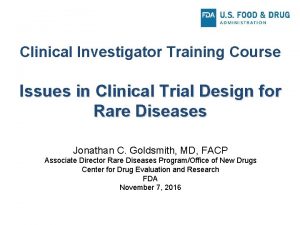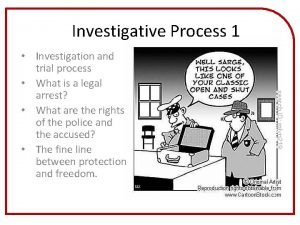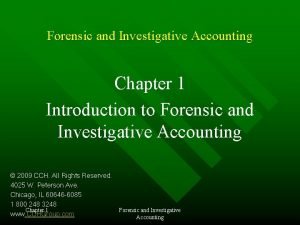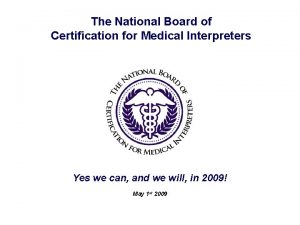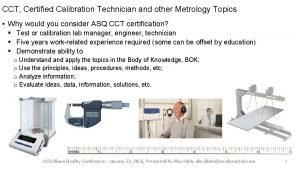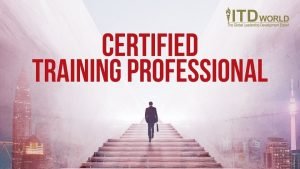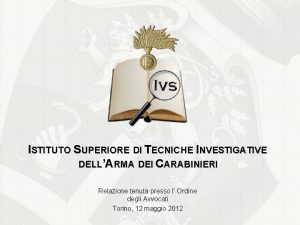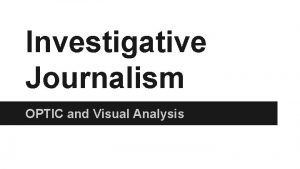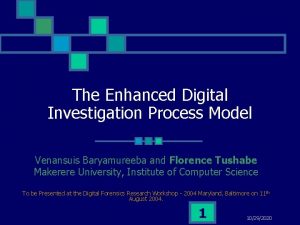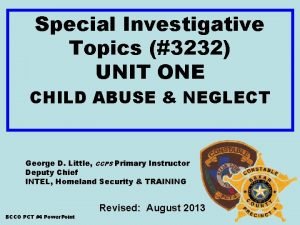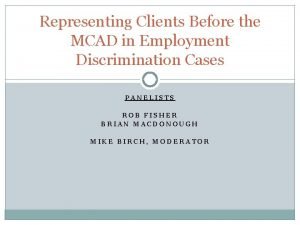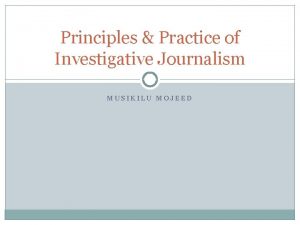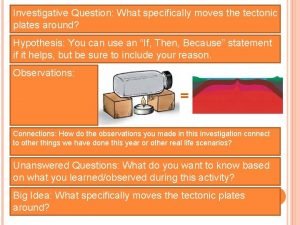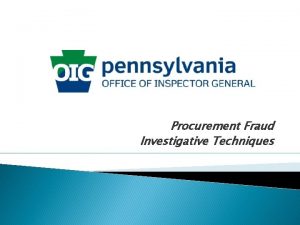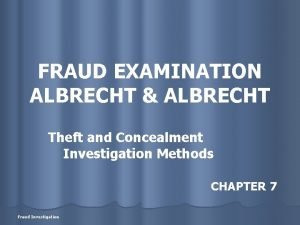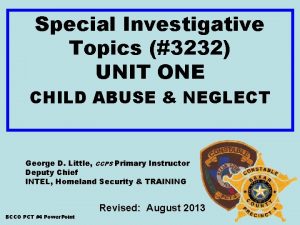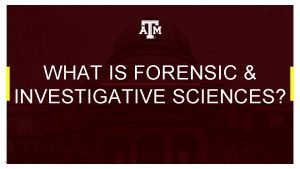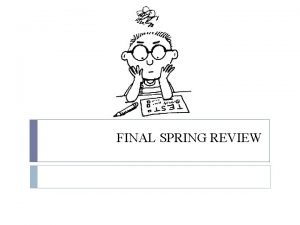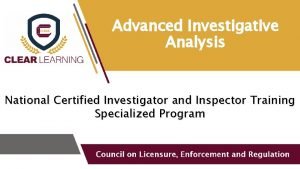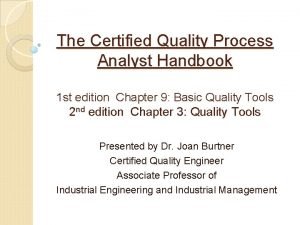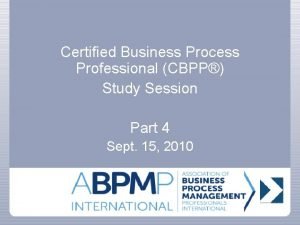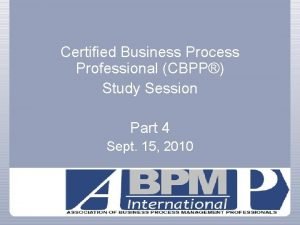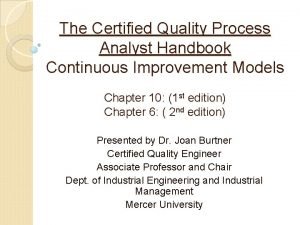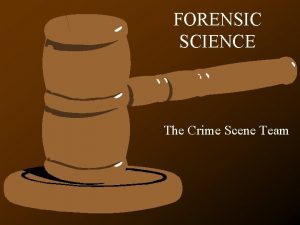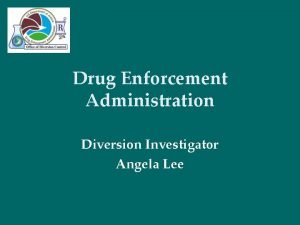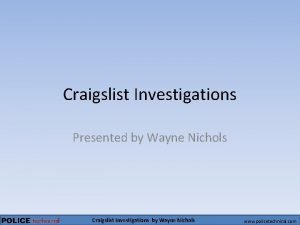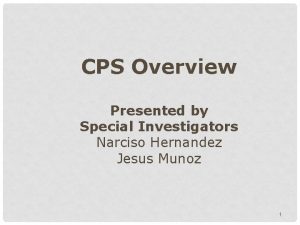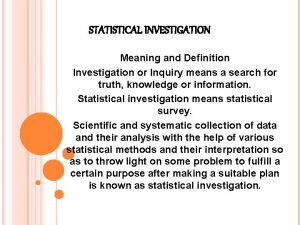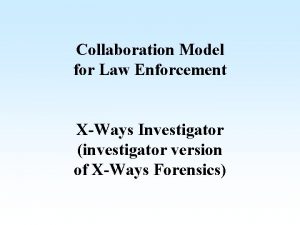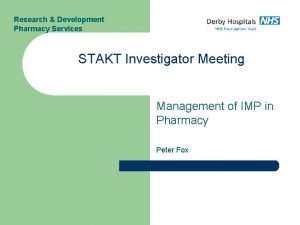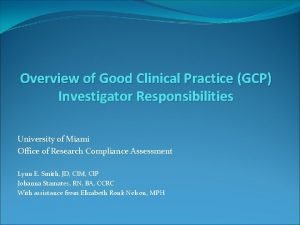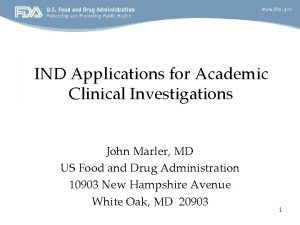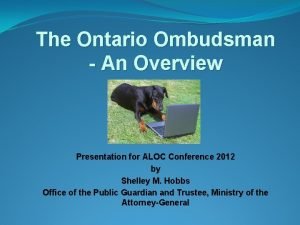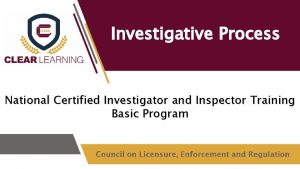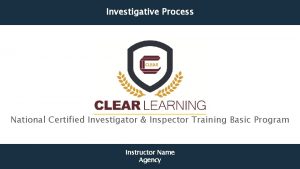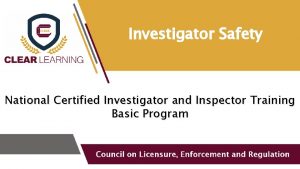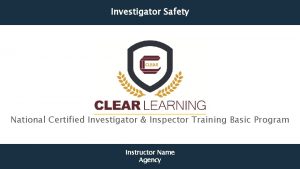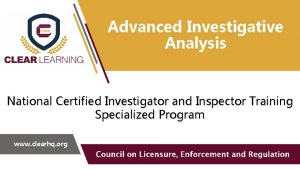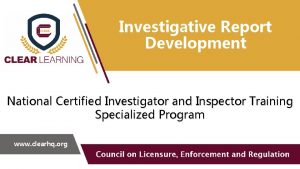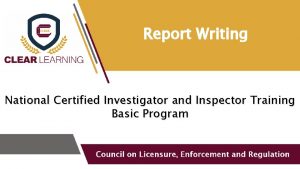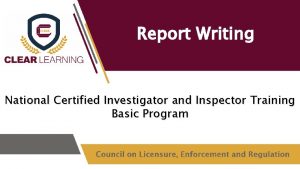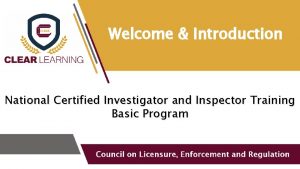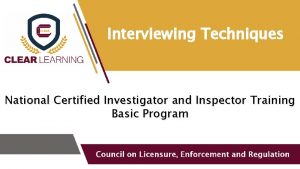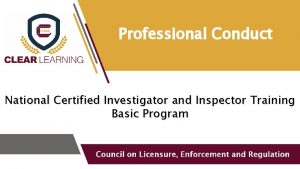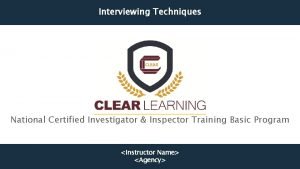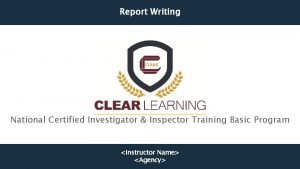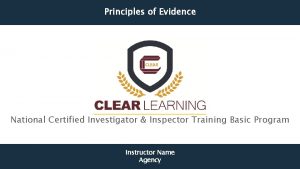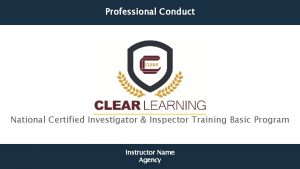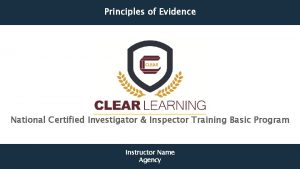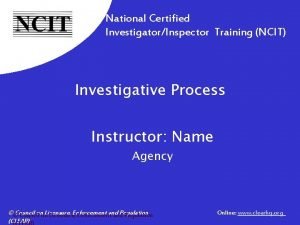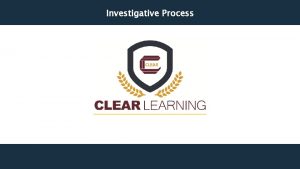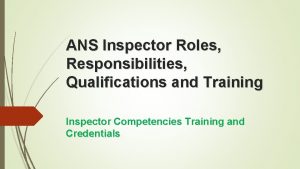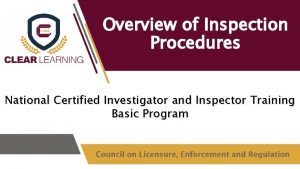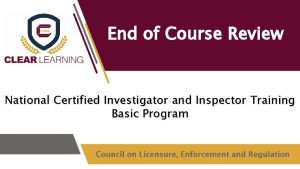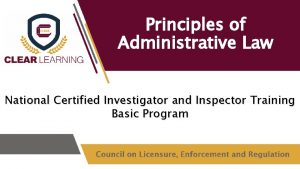Investigative Process National Certified Investigator and Inspector Training


















































- Slides: 50

Investigative Process National Certified Investigator and Inspector Training Basic Program

Session Introduction

Upon completion of the session, you will be able to: Learning Objectives § Identify and analyze the elements of the complaint process. § Identify the Standards of Acceptance, that is, legal sufficiency and jurisdictional tests, and be able to give a working definition of the terms. § Identify and select proper investigative methods

Upon completion of the session, you will be able to: Learning Objectives § List and explain seven sources for obtaining information to implement an investigative plan. § Identify resources required to implement an investigative plan.

Session Map Investigative Process Definitions Intake of Complaints Complaint Analysis Investigative Planning Execution

Definitions

Definitions Term Complaint Definition An expression of pain, dissatisfaction, resentment, discontent or grief The presentation by the plaintiff in a civil Complaint (legal) action, setting forth the claim on which relief is sought, i. e. Administrative complaint A complaint is legally sufficient if the facts as Legally Sufficient alleged, if shown to be true, would constitute a Complaint violation of applicable law(s) or rule(s)

Definitions Term Allegation Inquiry Jurisdiction Violation Definition To assert, affirm, or declare, with or without proof, of a claim or concern A close examination of some matter in a quest for information or truth The right and power to interpret and apply the law To break a law, rule, or regulation intentionally or unintentionally

Intake of Complaints

Source of Complaints Consumer Other professional licensees Professional associations/societies Other state agencies Internally generated Law enforcement agencies Media Insurance companies Federal Agencies Anonymous Hospitals Attorney representing complainant

Standard of Acceptance Jurisdiction § Right and power to interpret and apply law Legal Sufficiency § When facts as alleged, if true, would constitute a violation of laws/rules

Other Issues in the Intake Process Complaints Information § Statutory Requirements § § Written Verbal or Oral Method of Receipt and Review § Centralized § De-Centralized Recording of Intake Information § Formal § Informal

Complaint Analysis

Complaint Analysis Definition The process by which raw complaint information, in the form of verbal and written statements and documents, is applied to statutory and regulatory guidelines and mandates

Complaint Analysis The Intake Investigation Peer Review Expert Assistance Jurisdictional Issues § Overlapping Jurisdictions § Levels of Jurisdiction

Intake Investigation Investigator must possess working knowledge of all applicable laws Area of jurisdiction and legal sufficiency may be furthered to higher levels of law

Intake Investigation Once complaint has met the Standards of Acceptance in analysis stage other actions are appropriate for consideration Spheres of activity investigator may face include: § Interface with criminal arena § Civil law proceedings § Cooperation by all regulatory agencies and law enforcement

Peer Review Allows investigators to: § Qualify further allegations § Quantify necessary elements of the violation Often necessary step of analysis depending on applicable laws of the state

Expert Assistance Use of experts must be considered in review stage of complaint process Experts often become witnesses in the investigation and litigation stage of the complaint process

Jurisdictional Issues Investigators will face overlapping jurisdictional issues § In complaint analysis stage § In investigation stage

Jurisdictional Issues Levels of Jurisdiction § Proper identification of appropriate level is key § Working cooperation and shared resources helpful § Investigator should maintain communication with appropriate officials/agents

Interagency Relations Behavior of Individuals § Result of Stimulus § Officials Play Roles § Predictable

Interagency Relations Interfacing with Agencies § Seek agencies with similar jurisdictions § Avoid “Turf Battles” § Avoid Criticism § Positive Influences § Remember the Goal: Cooperation

Investigative Planning

Investigative Planning Actual role, and how you assume the role are most important to investigative plan Role of the Investigator § Proper Review of Complaint § Powers and Authority

The Investigative Plan Format Ask all of the important questions Time is of the essence Who How What Questions to Ask Why Where When

Case Development Questions What are the allegations? What law or regulations may have been violated? § Administrative § Judicial § State/Federal What evidence will be needed to support the allegations? § Testimony § Physical § Documentary § Other

Case Development Issues Directly Related to Complaint Elements Sources of Information Witnesses Legal Instruments Collect and Maintain Evidence Experts Problems

Case Development Issues Indirectly Related to Complaint Priority Assignments Costs Geographic Considerations Staff Training/Talent/Skill Levels Board Rules and Policy

Selection of Investigative Method Field/Central Office Inspection Use of Experts or Consultants Undercover (covert) vs. Direct (overt)

Required Reports and Records Almost all agencies have the power to require records Fourth amendment does not protect against report requirements Required records not protected by fifth amendment

Physical Inspections/Inspection Warrants Primary function of administrative inspection Must not violate Fourth Amendment Warrantless searches permissible in industries subject to licensing and intensive regulation

Subpoenas and Search Warrants Subpoena (Subpoena Duces Tecum) § Official command has coercive effect § Fifth Amendment self incrimination conflicts Search Warrants § Requires Probable Cause § Not often used in administrative cases

Hearings, Demand Letters and Interviews Investigative Hearings § Used to further investigation and gather evidence § Known as informal fact-finding § Used to explore possible violations Demand Letter § Issued to suspect or witness § Outlines info requested and steps to be taken Interviews

Investigative Planning Seven Basic Sources for Obtaining Investigative Information

Individual Investigator Has files that contain best source of information Knowledgeable of past investigations Access to other agency investigators, staff and records Records of other regulatory or law enforcement agencies

Complainant Provides the needed information that becomes the foundation of the investigations Identifies others involved who have knowledge of the incident

Respondent Subject of investigation provides response to aggrieved party’s allegations Obtain copies of documents and records that substantiate the complaint Identify others who have knowledge of incident

Witnesses May add credibility to the complaint or refute allegations Obtain documents and records in their possession pertinent to the compliant Be aware of the relationships between witnesses and complainants and/or respondents

Public Records Provide independent information to verify or refute complaints Provide leads for further interviews Furnish legal basis for obtaining a subpoena

Private Records Third party records that reflect what should be in the respondent’s records Third parties may be free to disclose own records § However a subpoena is required if the relationship between the third party and the respondent is sensitive

Physical and Electronic Evidence Scene/premise searches Behavior generated evidence Surveillance/undercover operation Individuals, business or government Databases (subject to privacy rights) Scientific evidence i. e. lab samples, test results Demonstrative evidence Commonly forgotten sources

Investigative Plan Number of Interviews Records Unusual Characteristics Covert vs. Overt Investigation Special Assistance

Investigative Planning Resources Personnel Materials Required Financial Resources

Execution

Execution of the Plan Flexibility § Must maintain flexibility in the planning process § Ability to shift emphasis or redirect investigations is critical § Circumstances can change, requiring a change in planning Activity vs. Results § Generally, investigators are activity-based § Management by Objectives (MBO) § Provides user with direction to reach a goal/objective

Execution of the Plan Prosecution Requirements § Relationship between investigator and prosecutor is important for the success of the investigation § Prosecutor’s requirements are a standard part of the working relationship § Burden of Proof Board/Departmental Policies Statutory Mandates

Session Review

You Learning Objectives Review should now be able to: § Identify and analyze the elements of the complaint process. § Identify the Standards of Acceptance, that is, legal sufficiency and jurisdictional tests, and be able to give a working definition of the terms. § Identify and select proper investigative methods

You Learning Objectives Review should now be able to: § List and explain seven sources for obtaining information to implement an investigative plan. § Identify resources required to implement an investigative plan.
 Clinical investigator training program
Clinical investigator training program Surete du quebec
Surete du quebec Introduction to forensic accounting
Introduction to forensic accounting National board certification for medical interpreters
National board certification for medical interpreters Asq cct
Asq cct Certified training professional
Certified training professional Child family investigator
Child family investigator Istituto superiore di tecniche investigative
Istituto superiore di tecniche investigative Visual investigative analysis
Visual investigative analysis Challenges of investigative journalism pdf
Challenges of investigative journalism pdf The phases of investigation
The phases of investigation 3232 special investigative topics
3232 special investigative topics Mcad rebuttal to position statement
Mcad rebuttal to position statement Principles of investigative journalism
Principles of investigative journalism What is an investigative question
What is an investigative question Investigative psychology definition
Investigative psychology definition Lamarck theory
Lamarck theory Tes sds
Tes sds Special investigative techniques
Special investigative techniques Fraud examination albrecht
Fraud examination albrecht Conventional realistic investigative
Conventional realistic investigative Special investigative topics 3232
Special investigative topics 3232 Investigative sciences
Investigative sciences Bottleneck effect
Bottleneck effect Balkan investigative reporting network
Balkan investigative reporting network Balkan investigative reporting network
Balkan investigative reporting network Flowchart tool
Flowchart tool Abpmp certification
Abpmp certification Certified business process professional
Certified business process professional Certified quality process analyst
Certified quality process analyst Sharedinvestigator
Sharedinvestigator Did investigator assign exposures
Did investigator assign exposures Rough sketch vs final sketch crime scene
Rough sketch vs final sketch crime scene Diversion investigator
Diversion investigator Craigslist private investigator
Craigslist private investigator Cps special investigator
Cps special investigator Bio-rad
Bio-rad What is a statistical investigation
What is a statistical investigation Early stage investigator nih
Early stage investigator nih X-ways investigator
X-ways investigator Userra vets investigator
Userra vets investigator Investigator meeting services
Investigator meeting services Invasive species investigator worksheet
Invasive species investigator worksheet Social media forensics investigator
Social media forensics investigator Invasive species investigator worksheet
Invasive species investigator worksheet Gcp investigator responsibilities
Gcp investigator responsibilities Investigator's brochure
Investigator's brochure Gmo investigator kit
Gmo investigator kit Investigator photos
Investigator photos Ontario ombudsman early resolution officer test
Ontario ombudsman early resolution officer test Swf investigator
Swf investigator
